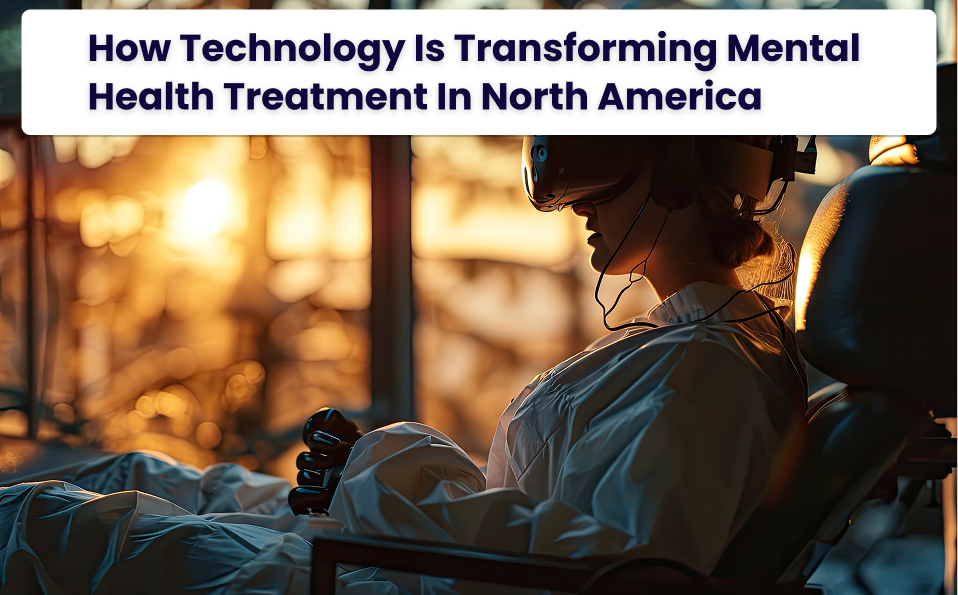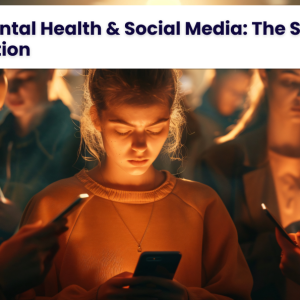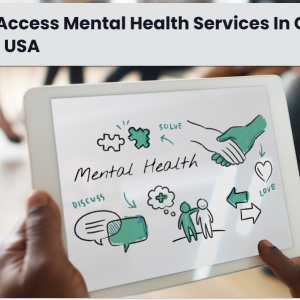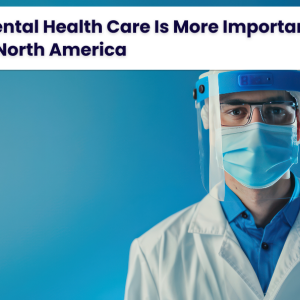
How Technology is Transforming Mental Health Treatment in North America
In recent years, mental health has gone from being a silent struggle to a global conversation. In North America, mental health challenges such as anxiety, depression, and stress have reached alarming levels. But with the growing demand for mental health support, technology is stepping in like never before, offering innovative solutions that are changing the way we approach mental well-being. Gone are the days of long waitlists and high costs; today, technology is making mental health care more accessible, personalized, and affordable than ever before.
Let’s dive into how these groundbreaking technological advancements are transforming mental health care in North America and why this change is so exciting!
The Mental Health Crisis: Why We Need Change
Mental health issues aren’t just a “fad”—they’re real, and they’re affecting millions of people. According to the World Health Organization, one in four people will experience a mental health disorder in their lifetime, and North America is no exception. The U.S. and Canada have seen a rise in conditions like depression, anxiety, and substance abuse, compounded by stress from factors like the pandemic and economic struggles.
While the demand for mental health care has skyrocketed, access remains a significant challenge. The National Alliance on Mental Illness found that over 60% of adults with mental health conditions in the U.S. didn’t get the treatment they needed in 2021. Whether it’s due to the stigma around seeking help, high costs, or living in rural areas with limited providers, too many people are left without support. And that’s where technology is coming to the rescue.
Teletherapy and Telepsychiatry: Therapy Without the Wait
Imagine being able to access therapy without leaving your house. No traffic, no waiting rooms, and no uncomfortable small talk. Teletherapy is making that possible.
Teletherapy involves virtual sessions with licensed therapists via video calls, phone calls, or even messaging platforms. This means you can have a session while you’re at home, in your car, or even on vacation—anywhere you have a reliable internet connection. It’s a game-changer for those who struggle with transportation, live in remote areas, or prefer the privacy of their own space.
Why Teletherapy Rocks:
- Convenience: No more scheduling headaches—therapy is just a few clicks away.
- Privacy: Skip the awkward waiting room and enjoy therapy in the comfort of your own home.
- Variety: You can easily find a therapist who suits your needs, no matter where you are.
During the pandemic, telehealth services saw a surge, and for good reason. In fact, 50% of psychiatric visits in the U.S. in 2020 were virtual! This model not only increased accessibility but also helped normalize therapy as a regular part of self-care. Whether it’s for anxiety, depression, or just general stress management, teletherapy is making it easier for people to seek help when they need it most.
Mental Health Apps: Support in Your Pocket
Let’s face it: most of us have our smartphones glued to our hands all day. So, why not use that screen time for good? Mental health apps are taking full advantage of the mobile revolution, providing users with tools for managing stress, improving sleep, and even getting support from therapists—all right from their phones.
Apps like Headspace and Calm offer guided meditations, mindfulness exercises, and breathing techniques that can help ease anxiety, while Talkspace and BetterHelp connect users with licensed therapists through text, video, or phone calls.
Why Mental Health Apps are a Game-Changer:
- Instant Access: Need help now? Apps provide immediate access to stress-relief techniques.
- Personalized Experience: Many apps track your mood, offering tailored exercises and advice based on how you’re feeling.
- Affordable: These apps are a fraction of the cost of traditional therapy, making mental health care more affordable for many.
Mental health apps are also increasingly using artificial intelligence (AI) to personalize your experience. AI can suggest meditation practices or even track your moods over time, giving you better insights into your mental well-being. Plus, they’re available 24/7, which means you can access support anytime, anywhere.
AI and Chatbots: Instant, Personalized Support
Ever feel like you need someone to talk to, but it’s 3 a.m. and your therapist is asleep? AI-powered chatbots are here to help! Tools like Woebot and Wysa use AI to guide you through conversations that help reduce anxiety, depression, and stress. These virtual assistants are trained in cognitive-behavioral therapy (CBT) techniques, which are clinically proven to help manage mental health conditions.
Why Chatbots Are Helping People:
- 24/7 Availability: Need someone to talk to? Chatbots are available anytime, even when your therapist is off the clock.
- Proven Techniques: They use evidence-based methods, like CBT, to help users manage their mental health.
- Immediate Relief: Chatbots provide instant support, so you don’t have to wait for your next therapy session.
AI can also analyze your data to predict mental health challenges before they escalate. Imagine if your smartwatch could detect early signs of anxiety by tracking your heart rate and sleep patterns—AI has the power to give you a heads-up, helping you manage your mental health more proactively.
Wearables: Monitoring Mental Health in Real-Time
Did you know that your smartwatch can help monitor your mental health? Wearable devices like the Apple Watch and Fitbit aren’t just for tracking steps—they’re also monitoring things like sleep patterns, heart rate variability, and stress levels, all of which are closely tied to your mental well-being.
Why Wearables Are a Secret Weapon:
- Real-Time Monitoring: Devices track your physical health and give insights into your emotional state.
- Built-In Tools: Some wearables offer mindfulness prompts and stress-relief exercises.
- Data-Driven Support: Data from wearables can help doctors create more personalized treatment plans.
Imagine a world where your smartwatch sends an alert when it detects rising stress levels and suggests a calming breathing exercise. With wearables, that world is already here—and it’s helping individuals stay on top of their mental health every day.
The Road Ahead: A Brighter Future for Mental Health Care
So, what’s next? The future of mental health technology is bright. We’re seeing exciting innovations like virtual reality (VR) therapy for conditions like PTSD and anxiety, which allows patients to confront their fears in safe, controlled environments. VR has the potential to revolutionize exposure therapy, making it more immersive and effective.
As AI, wearables, and digital health tools continue to evolve, the way we approach mental health care will keep getting better. More accessible, more personalized, and more supportive, these technologies are paving the way for a future where mental health care is available to everyone—no matter their location or budget.
Summary
Technology is doing more than just making life easier—it’s making mental health care more accessible, personalized, and affordable than ever before. From teletherapy and mental health apps to AI-powered chatbots and wearables, these tools are transforming the way we manage our well-being. In the future, technology won’t just help us survive—it will help us thrive.





